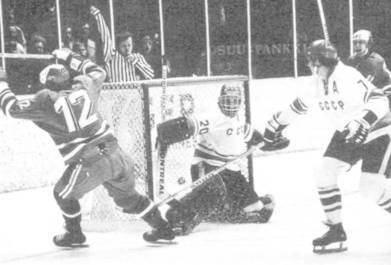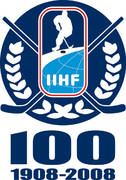Story #67
April 10, 1974 – Helsinki, Finland
This is what coaches dream about – the perfect game. A game in which you don’t have to scream and shout, take a timeout, or write a myriad of X’s and O’s on the chalkboard between periods. A game where you simply relax and let the players do their job and just make sure they don’t wake up. This is probably how the Czechoslovak coaches Karel Gut and Jan Starsi felt on April 10, 1974, during the game against their eternal rivals, the world champions Soviet Union, midway through the 41st World Championship in Helsinki, Finland.
It must be remembered that the CCCP team had won every world title between 1963 and 1971. The Czechoslovaks broke the nine-in-a-row with their historic home win in 1972, but the Soviets bounced back emphatically by thrashing every opponent at home Moscow the next year. And, apart from winning ten world titles in eleven years, they also claimed four of the five last Olympic gold medals (1956, 1964, 1968, 1972). Further, in the 1972 Summit Series against Canada, the Soviets proved that they were as good as any team on the planet.
Of course, even the “Big Red Machine” lost the occasional game, but they never lost by a wide margin. Canada’s 5-0 win at the 1955 World Championship was the biggest win so far by any team against the USSR, but the Soviets had entered the international scene only one year earlier (albeit dramatically, winning gold from Canada with a 7-2 victory in the decisive game).
Nobody who witnessed the game at the Helsinki Ice Stadium on that day in 1974 will ever forget what happened. Vaclav Nedomansky got Czechoslovakia ahead in the eighth minute and two late first-period goals by teammates Oldrich Machac and diminutive Vladimir Martinec made it 3-0 at the first intermission. The Soviets were shocked, as was the capacity crowd. But things would just get worse for the team that never knew how it felt to be humiliated.
Ivan Hlinka got the fourth goal midway through the game. Bohuslav Stastny made it 5-0, and when Martinec got his second late in the middle stanza, the Helsinki arena scoreboard told the most incredible story: Tshekkoslovakia – Neuvostoliitto 6-0.
In the second intermission reporters were running around madly in the press centre, calling their offices and asking colleagues to search in books to find when was the last time a Soviet team lost by such a margin. The reply was, “never”. Fans in the arena and millions of TV viewers made a simplistic calculation: a 6-0 game after two periods meant a 9-0 final score! Could this really happen?
No, not quite. Boris Mikhailov and Vladimir Petrov’s consolation goals in the third period sandwiched Ivan Hlinka’s second marker for the night, but it still was a rout: 7-2 for Czechoslovakia – the biggest loss ever in the history of the Soviet Union ice hockey in an official game, including World Championships, Olympics, Canada Cups and the Summit Series. The Czechoslovaks had just played the perfect hockey game.
Goaltender Vladislav Tretiak had never before conceded seven goals in one game for the national team (he never did again, either). The Soviet team existed until 1991, but it never experienced a worse loss. But how do coaches Gut and Starsi and the players remember Helsinki 1974? With bitterness. The best game ever played against the most superior team didn’t earn the winners the gold medal.
These were the days when the tournament was a double round-robin affair and final position in simple standings determined the medals. Czechoslovakia lost the second game against the Soviet Union, 3-1. On top of that, they lost one game each to Sweden and Finland and had to settle for a silver medal.
But the 1974 World Championship will forever be remembered for one game when a team played perfect hockey.
As part of the IIHF's 100th anniversary celebrations, www.IIHF.com is featuring the 100 top international hockey stories from the past century (1908-2008). Starting now and continuing through the 2008 IIHF World Championships in Canada, we will bring you approximately three stories a week counting down from Number 100 to Number 11.
The Final Top 10 Countdown will be one of the highlights of the IIHF's Centennial Gala Evening in Quebec City on May 17, the day prior to the Gold Medal Game of the 2008 World Championship.
These are the criteria for inclusion on this list: First, the story has to have had a considerable influence on international hockey. Second, it has to have had either a major immediate impact or a long-lasting significance on the game. Third, although it doesn't necessarily have to be about top players, the story does have to pertain to the highest level of play, notably Olympics, World Championships, and the like. The story can be about a single moment — a goal, a great save, a referee's call — or about an historic event of longer duration — a game, series, tournament, or rule change.
|
 |
Click here for the 100 Top Stories
|










